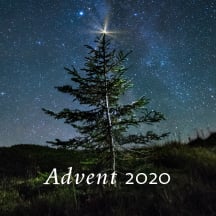
The first time I read the Canticle of Zechariah I remember feeling a little bit stunned. I’d learned in my elementary school religion class that Zechariah questioned the angel and lost his voice. Compared to Mary’s unreserved and perfect Fiat, our favorite Jewish priest kind of botched the whole angel-appearing-to-you thing. We were told that he was finally able to speak when John was born but we never really covered just what he says. So his Canticle, this beautiful song of love and trust in God, came as somewhat of a shock. Could this really be the same man? Is this the same Zechariah that doubted God’s word only a few verses ago?
The answer, obviously, is yes, and the reason lies somewhere inside those verses. We know that the pregnant Mary, after the Annunciation went with haste to help her cousin Elizabeth, and stayed there for three months. Throughout that time Zechariah sat in silence, contemplating Mary and the God humble enough to be born by her. He watched as the same God of Israel who dwelled in the Temple chose to become one of us in the womb of a poor girl. He watched as God worked through Mary, in her own humility, in her radiant joy, in her ardent charity. In his silent contemplation, he came to know both God’s faithfulness and tender love, as well as his own need for Christ. It sounds a lot like our own Advent season. For four weeks we have been journeying with the pregnant Mary. We have prayed in silence and exclaimed in song, “O Come Emanuel.” We have contemplated the mystery of the Incarnation and our need for God to break into our lives.
What we come to see is that God never asks us to understand our own poverty and littleness as a cruel exercise. He asks us to know ourselves better always in the light of the Incarnation. Often we hide those parts of ourselves we know don’t measure up. We think those areas where we don’t know the answers, or where we aren’t in control, or where we simply can’t love another make us unlovable. But the Incarnation shows us that God is not afraid of our messiness, our uncertainty, our helplessness. He not only loves us in the midst of our limitations but takes on our nature. He consecrates our littleness and our poverty so that they are no longer our shame but our hope—because now in our humility we can learn to imitate Him. The shadow of death holds no sway, because our tender and compassionate Lord has made Himself fragile like us, that we may be holy like him.
This has been an unprecedented year full of sorrow and loneliness, boredom and helplessness. But tomorrow, Christmas Day will dawn. Let us not be afraid to draw near to our mother Mary in prayer, whose own first Christmas was surrounded by chaos and uncertainty, and ask her to draw us closer to the divine child in her arms, who from before time chose us in love. Like Zechariah, may we always be humble enough to see ourselves by the light of Christ the Radiant Dawn, so that we may come to experience more intimately the depth of His love and walk in His way of peace.



